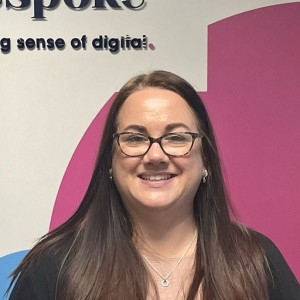
7 minutes
Not every retainer is successful for the client or the agency.
In this video, Laura and Steve explain the three key reasons why this might happen. It could be an unmatched agency, poor collaboration, or the tactics aren't right for the objective.
Bespoke has been generating 100,000s of leads for our clients for over 20 years; our expertise is built on real results.
Laura: So Steve, we've been providing marketing retainers at Bespoke for 25 years and in that time, we've learnt a little bit about what makes them successful and
what can make them fail. So we've had retainers that have been 5, 10, 15, even 20 years, but we've also had some that haven't been as successful and what do you think, can you give us some reasons why a marketing retainer might not be successful?
Steve: Maybe there's two different things that we see, we get the calls, don't we? From everybody, every week, we get a call from somebody about something that's not working, and we talk it through with them. So we hear people who describe to us a retainer that's not getting the result they want or they're confused about it or something, so we hear that a lot. And then we’ve a couple of examples of our own where it's not gone as we've wanted and I guess, actually, if you think back over 25 years, we've seen all the reasons they do work and don't work. So and when a retainer isn't successful, by which we mean maybe the agency doesn't consider it a successful engagement or the client doesn't, or both but either way, you know, doesn't want to renew, it's always the same things. So we can do it in three headlines, I guess. So the number one thing that makes a retainer not work is the simplest of all, which is the agency just isn't matched. So for example, let's say we're a 10 million pound turnover service business looking for b2b leads, but we've hired an agency who are mostly doing e-commerce retainers or retainers for 100 million pound companies or a billion pound companies, or startups or something. It's never going to work. So we've always got to be aligned with the agency, there’s not an agency that special specialises in our niche. So that's sort of an easy one to identify there.
Laura: It'd be good to see examples of that agency working within your sector, to know that they would be a good match for you.
Steve: Yeah, maybe you can sit with them and they can talk through 5 or 10 people in the same scenario and show you what they've done and, you know, you can see there's a normal way of doing this and it works, so that's one. Another one actually, you would know about from the work you've been doing, which is about the engagement and the way we engage with the clients.
Laura: Yeah absolutely, face-to-face.
Steve: Face-to-face, yep. Look at each other in the eye and talking about the results, the outcome. You know, not the low-level results, the sort of ‘what's the seo position?’ What's the traffic?’ but actually, ‘what's the return?’ ‘What's the leads?’ ‘What's the sales?’ ‘What's the ROI?’.
Laura: And working with them as well, that's key, isn't it? The collaboration.
Steve: Yeah, so we sometimes say you can have an us and them with your supplier, where you might be saying, ‘aren't they doing well? The agency’ or ‘why aren't they reporting clearly?’ or ‘the results aren’t, they're not, they're failing on results’ you know, this sort of thing. But it's us and them, and it should actually be that the agency and the in-house marketer or marketers are dovetailed together and they're working to the same strategy, they’ve divided the work up between them. There are some things the agency should always do and some things the in-house team should always do, which we’ll go into on a different video. But yes that you're all working to the same strategy, you're sharing information on the ideal customer, on the value proposition, you understand the product, the market and so on. And when they work together, dovetail, it's really good because it grows the sort of understanding on both sides actually. So yes it will be that we're working together to solve this issue not that it's an us and them and ‘why aren't they delivering?’ and ‘get them into report to us’ and all this sort of thing. So yeah the eye-to-eye you know, regular meetups, that sort of thing. That's a big one as well.
Laura: Yeah.
Steve: And then the third thing is, how do we describe this? So it's that a lot of things have been done right, maybe even 80% of things been done right, but for some reason a couple of key things are missing. So we've had examples, if we think back for our last two or three years, we had two retainers where we weren't really happy with results ourselves. The client wasn't really happy as well and it was the same thing in both case. We were doing lots of very good campaigns that were working on other accounts, everything was the same as other accounts that working really well, the difference was a couple of key cogs in the marketing operation were missing. So for example if you run a brilliant retainer with brilliant campaigns, you know the targeting is just right, the audience is just right, the tactic is just right and so on, but the brand guidelines are poor, then it brings the whole performance down, and likewise it would be the same with the website. So if you've invested massively in the retainer and everything's perfect but you've got a 5 year old website and it's, the messaging is old and it's a bit clunky, it's just going to bring down the overall result. So we have our little map, don’t we? With the 12 cogs that you've got to get right, in a you know, marketing engagement with the client and we found these, there's just two or three that were missing and the client didn't want to do those projects yet. So it was very difficult actually to get a maximum result, or impossible, I suppose. So yeah the three things, having the right agency is the first one, well matched. The style of engagement being collaborative. not us and them. And then the third piece being just having all the cogs that needed in place, and we'll guide our clients on that, and an agency should always guide its clients on ‘let's get the full thing together’. And when you tick off those three you don't tend to get the failures.
Laura: Yeah, brilliant. So if there is an agency that people aren't happy with, or they feel that something's not quite right, if someone's got a retainer with someone and it's not quite working for maybe both of them, what would your advice be to them?
Steve: If it was me I would pick an agency that I'd never spoken to, I'd pick an agency that's obviously busy, in demand that works exactly in my sector, working with my size of company in my industry, similar sort of brief and I just get that free call with them. That free 30 minutes and just say ‘look, if I was running a retainer with you, what would it look like? What would the cost be? What would be involved? What would the tactics be? How would you sort of present to us to do that?’. Maybe I’d even do that with a second company and a third. But you can go and get that free sense check pretty easily, so you know, why not do that? If it just reinforces what you're already doing is right, then great, but most likely it sort of reveals, you know, the thing that's given you the itch to go and look into it, you know, in a very straightforward way ‘here's the answer, here's what's missing’.
Laura: Brilliant, thanks, Steve.

